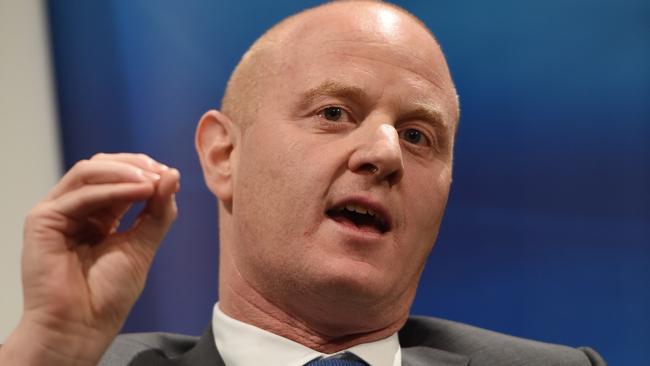CBA execs stripped of bonuses over money-laundering scandal
CBA chair Catherine Livingstone is expected to impose further sanctions on the bank’s scandal-hit executive ranks.

Commonwealth Bank chair Catherine Livingstone is expected to impose further sanctions on the bank’s scandal-hit executive ranks, after yesterday stripping the bank’s top managers of more than $16 million in short-term bonuses.
In an unprecedented move for a major bank in Australia, Ms Livingstone said the short-term bonuses paid to chief executive Ian Narev and his 11 direct reports in 2016 would be cut to zero in 2017 due to the bank’s money-laundering crisis.
Directors, including Ms Livingstone, would also take a 20 per cent cut in their fees, although the chairman said Mr Narev “retains the full confidence of the board”.
“In reaching this conclusion, the overriding consideration of the board was the collective accountability of senior management for the overall reputation of the group,” she said.
The heavy scrutiny will continue today, when Mr Narev faces investors for the first time since the money-laundering scandal became public last Thursday, with the bank expected to unveil an annual cash profit of about $9.8 billion.
Bank insiders said the move, announced yesterday as a three-day board meeting drew to a close, was only the first strike in response to the reputational hit from the multiple laundering breaches identified by Austrac in its Federal Court statement of claim.
Further accountability measures would be determined once the bank completed its investigation and lodged its defence.
“This (bonus measure) is only what the board can do right now,” a source said.
In the meantime, the bank’s remuneration report, to be released next Monday, will show that David Craig, who retired as chief financial officer on June 30, has been caught in Ms Livingstone’s bonus crackdown.
Part of the remuneration of former chief risk officer Alden Toevs, who retired on July 30 last year, could also be caught in the net if the bank decides to invoke clawback measures.
The revelation that CBA failed to report tens of thousands of suspect cash deposits to Austrac has triggered yet another crisis for the nation’s top financial institution, after previous conduct-related issues such as rejected life insurance claims in 2016, poor financial planning advice (2014) and the Storm Financial collapse (2012).
Even so, short-term bonuses only made up a small part of Mr Narev’s $12.3m remuneration last year. Of his total pay, $2.86m was in short-term payments. Likewise, only a small portion of former chief financial officer David Craig’s $6.4m remuneration was in the form of short-term bonus payments.
The bank’s retail banking chief, Matt Comyn, is expected to feel the pain more acutely — nearly half of his $2.9m remuneration last year was in short-term payments.
Scott Morrison revealed in parliament that he had been briefed by Austrac on Monday and had met with Ms Livingstone yesterday.
The federal Treasurer said he had made it clear to CBA that “all options” were on the table.
Governance experts, investors and proxy advisers described the bonus crackdown as a “good first step”.
Martin Lawrence, a principal at proxy advisory firm Ownership Matters, said only one major-bank executive in the past decade — at National Australia Bank — had suffered a zero short-term bonus outcome.
Further, over the past four years, only one CBA executive had received less than their full bonus entitlement, which was 100 per cent of fixed pay. Even then, the bonus was 95 per cent of what was available.
“So this is something that’s really, really unusual,” Mr Lawrence said. “It’s a good first step based on what we know today.”
Louise Davidson, chief executive of the Australian Council of Superannuation Investors, said she wanted more detail about CBA’s plans, but the culling of executive bonuses was a “positive step”. Ms Davidson said: “Clearly there needs to be change of some sort.
“Accountability has to be at the top of the organisation, which means the board and the chief executive, so more repercussions are likely and they could be felt at the personal level and with remuneration.”
A major shareholder in CBA praised Ms Livingstone for showing leadership.
“There would have been a media firestorm if the bank hadn’t taken some swift action,” the shareholder said.
“This amounts to a stay of execution for management, which gives CBA time to find a replacement chief executive.”
The investor said Mr Narev, after 6½ years in the job, only had a further 12-18 months, and that was before the Austrac scandal.
It was now likely he would go in 12 months, which was a reasonable period for the board to identify an external successor.
While Mr Comyn was regarded as the heir apparent, the investor said the retail banking boss’s prospects had been tarnished by the Austrac scandal, which had originated in his division.




To join the conversation, please log in. Don't have an account? Register
Join the conversation, you are commenting as Logout